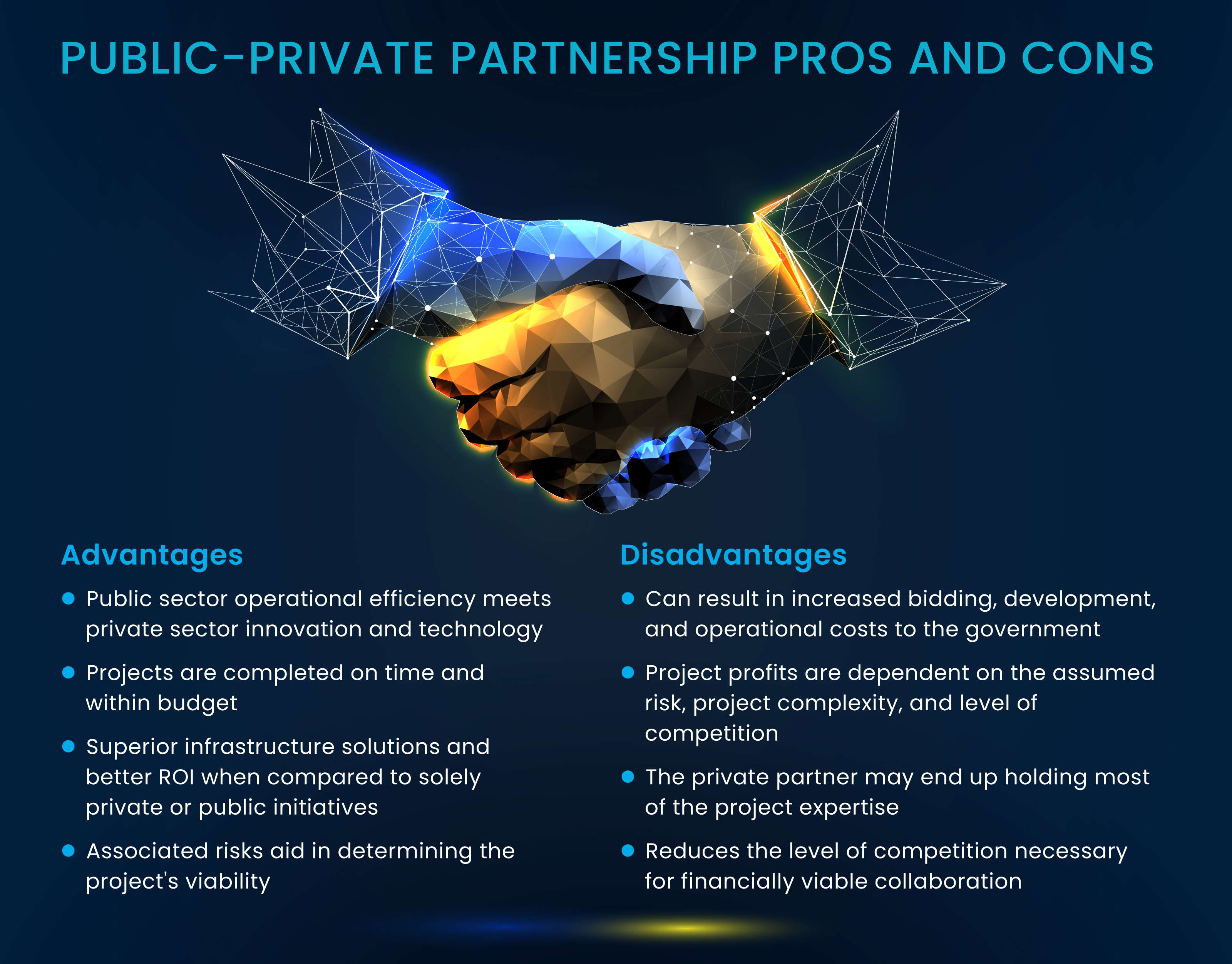Infrastructure investment has a significant impact on economic growth, according to a 2020 GI Hub study, which found that the economic multiplier for public investment (including infrastructure) is 1.5 times greater than the original investment in two to five years - significantly higher than other forms of government spending.
Building new, dependable, and sustainable infrastructure is essential for combating climate change and fulfilling the rapidly increasing aspirations of billions of people worldwide.
Congested and insufficient ports, airports, and highways stifle growth and trade.
Investment in infrastructure promotes new economic opportunities, increases economic growth rates, and makes it easier to invest in human capital.
Enhancing Infrastructure Access Through Public-Private Partnerships
Public-private partnerships (PPPs) can be used to provide more people with high-quality infrastructure services. The public-private partnership offers a choice that falls in between public procurement and privatization for governments looking to increase infrastructure. When governments lack the initial funding, it brings private sector expertise, efficiency, and capital to improving public assets or services.

When designed and implemented correctly in a balanced regulatory environment, public-private partnerships can improve the efficiency and sustainability of public services such as energy, transportation, telecommunications, water, healthcare, and education. Private firms consent to managing risk and taking on management responsibilities in exchange for performance-based profits.
Let us delve into the details of this arrangement, how it functions, and consider a few advantages and disadvantages that come with it.
What Are Public-Private Partnerships?
Public-private partnerships are contracts or arrangements between government agencies and private entities to plan and execute a project, asset, or service to the public.
These partnerships usually involve large infrastructure projects such as public transportation networks, hospitals, convention centers, or the development of public spaces and amenities. Based on its competencies, the responsibilities of the private partner can extend to the project's planning, finance, design, management, construction, maintenance, or operation.
How Public-Private Partnerships Work
Suppose a city or town administration cannot carry out a capital-intensive infrastructure project due to financial constraints. In that case, a private entity steps in to execute the project. In return, the private sector partner receives compensation, such as a fixed fee or a share of revenues generated by the project or service.
Public-private partnerships can also transfer some of the risks associated with a project or service to the private sector partner, which helps reduce the burden on the public sector.
The private-sector organization may also participate in designing, constructing, and implementing the project, while the government agency monitors compliance and ensures that objectives are met. Public-private partnerships are usually long-term arrangements, with contracts that can last decades.
However, public-private partnerships can also be complex and controversial, and it is important for the public and private sector partners to carefully consider the terms of the arrangement and ensure that it is in the best interests of all parties involved.
Advantages of Public-Private Partnership
Public-private partnerships bring with them various advantages as well as potential risks and disadvantages. First, a look at the benefits of incorporating a public-private partnership:
-
- The operational efficiency of public services can benefit from private-sector innovation and technology
- PPPs incentivize the private partner to complete projects within the allotted time frame and the established budget (Establishing current and projected costs of large-scale infrastructure projects helps ensure budgetary certainty)
- Public-private partnerships can offer superior infrastructure solutions and better ROI than entirely private or completely public initiatives
- Early acknowledgement of the associated risks helps establish the project's feasibility

Disadvantages of Public-Private Partnership
Alongside the above advantages, there are a few potential pitfalls associated with public-private partnerships. We have enumerated a few of these disadvantages below:
-
- Public-private partnerships can result in increased bidding, development, and operational costs to the government, so it is important to have a system in place to analyze the costs and feasibility of projects
- Project profits depend on various factors, including the assumed risk, project complexity, and level of competition
- If the private partner holds most of the project expertise, the government agency is likely at a disadvantage and may not be able to gauge the proposed project cost
- Diminishes the level of competition necessary for a cost-effective collaboration
Public-Private Partnership Examples
Public-private partnerships can take many forms and can be used to fund, build, and operate a wide range of projects, including infrastructure, social services, and public facilities. Here are a few examples of public-private partnerships:
Highway construction: A government agency may partner with a private construction company to build a new highway. The private company would be responsible for designing and building the highway, while the government agency would oversee the project and provide funding.
Public transportation: A city government may partner with a private transit company to operate a bus or rail system. The private company would maintain and operate the vehicles, while the government agency would set fares and routes.
Social services:A government agency may partner with a non-profit organization to provide social services, such as homeless shelters or job training programs. The non-profit would operate the programs and deliver the services, while the government agency would provide funding.

Public facilities: A government agency may partner with a private company to build and operate a public facility, such as a sports stadium or convention center. The private company would be responsible for designing, building, and managing the facility, while the government agency would provide funding and oversee the project.
Water and wastewater treatment: A government agency may partner with a private company to design, build, and operate a water or wastewater treatment plant. The private company would maintain and operate the plant, while the government agency would provide funding and set regulations.
What Is Revenue Risk in a Public-Private Partnership?
Revenue risk in a public-private partnership (PPP) refers to the possibility that the private partner will not generate sufficient revenue to cover its costs and fulfil its contractual obligations. This can occur if the project generates less revenue than expected or the private partner cannot effectively manage and optimize its revenue streams.
There are several ways that revenue risk can be managed in a PPP:
Financial guarantees: The private partner may request financial guarantees from the public sector to ensure a minimum level of revenue.
Risk sharing: The parties may agree to share the revenue risk, with the private partner receiving a higher return if the project is more successful and the public sector receiving a lower return if the project is less successful.
Contract structure: The contract between the public and private partners may include provisions that allow adjustments to the terms of the agreement in the event of changes in revenue.
Performance-based payments: The private partner may be paid based on the project's performance rather than on a fixed fee or cost-plus basis.
Insurance: The private partner may purchase insurance to protect against revenue risk.
How Do You Build Effective Public-Private Partnerships?
Public-private partnerships are usually long-term agreements, with contracts that can span multiple decades. These contracts must have an element of flexibility built in to accommodate technological, environmental, political, and demographic changes that may occur during the project's life cycle.
How project risks are distributed across partners, the established agreement framework and principles, and the protocol for handling inevitable changes that will occur during the project will determine the long-term success of the partnership.
The long-term sustainability and stability of the project depend on how the agreement is structured, and it is vital to include a clearly articulated set of incentives and penalties for both parties.
How Can Knowledge Ridge Help You Leverage Public-private Partnerships?
Our seasoned experts and public-private partnership specialists at Knowledge Ridge bring diverse backgrounds in project finance lending, private equity, multilateral banks, and government services to ensure their relevance to a wide range of topics.
With backgrounds in project finance lending, private equity, multilateral banks, and government services, we have access to seasoned experts and public-private partnership specialists.
At Knowledge Ridge, our experts offer clients first-hand actionable intelligence and real-time industry insights, sharing seasoned expertise and helping drive solutions of significant business impact.
Knowledge Ridge has access to a worldwide network of custom-vetted experts in over 80 countries and across 158 sub-industries. Backed by this pool of expertise with their unique backgrounds and multifaceted outlook toward modern-day business challenges, Knowledge Ridge can ensure that public-private partnership projects become bankable.
Reach out to learn more about how Knowledge Ridge can help you build a successful, lucrative, and sustainable public-private partnership.
Unlock the Potential of Your PPP Project
Unlock the Potential of Your PPP Project

